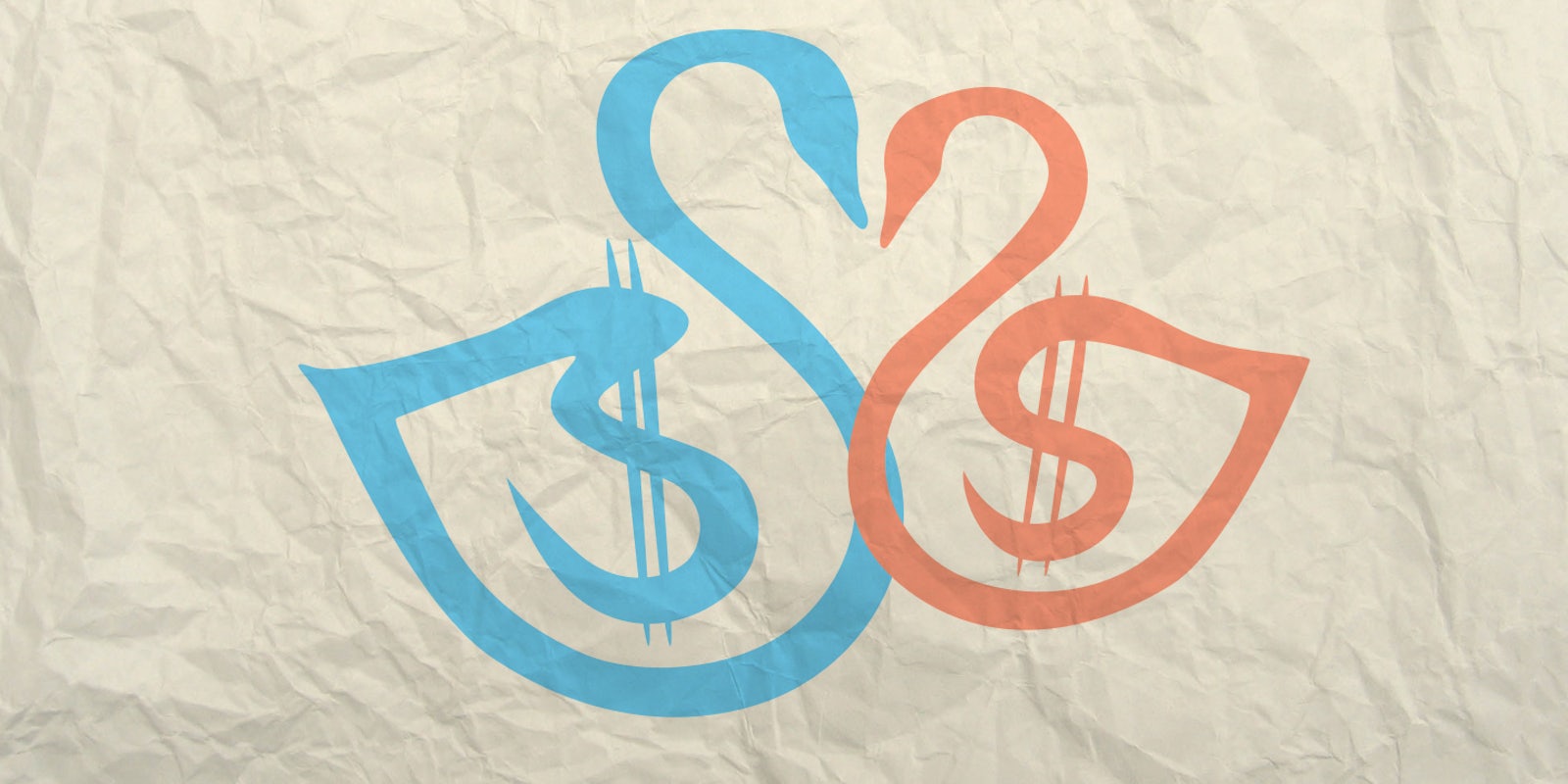It sounded too good to be true: $10,000 towards your dream wedding and the only catch is that you’d have to pay the money back if you got divorced. For couples madly in love and low on funds, this money would make all the difference.
But when it came time for the service’s February launch, interested couples got a nasty surprise: there was no money to give.
SwanLuv was the buzz of the Internet in early December 2015, with the Seattle-based startup announcing its grand plans to help brides and grooms-to-be shoulder the cost of their nuptials—pending they stayed married. If they got divorced, they’d have to pay back the money with interest. With stars and dollar signs in their eyes, couples signed up en masse, and received this simple email in return:
Thank you for registering for SwanLuv. We will send you the application to apply through email after we launch in February 2016.
Follow us on social media for the latest SwanLuv updates. :)
Kindest Regards,
SwanLuv Team
The service launched on Monday, the day after Valentine’s Day, and couple’s flush with love were excited to apply for this hefty sum of money. But when they visited SwanLuv’s website and Facebook page, an announcement revealed that it had, in Silicon Valley-speak, pivoted. Instead of offering $10,000 out of its own funds, it would allow couples to crowdfund their weddings via SwanLuv, with the company presumably getting a cut of the money raised. And if a couple divorces, they must pay the money back to the donors. Not only were they not getting money, they would have to do much of the heavy lifting.
When you try to visit SwanLuv.com, you get a message saying the webpage is not available. But a Facebook post from Tuesday lives on.
On Wednesday, founder Scott Avy took to Facebook to clarify the company’s change of heart. He wrote:
Hi All,
We sincerely apologize to anyone we have upset by adjusting our funding platform.
The initial business plan was to provide a lending model, “Receive funds up to $10,000 towards your dream wedding for FREE (paid by members that don’t stay married).”
Due to overwhelming demand (nearly two billion dollars at $10,000 per couple) and unanticipated legal regulations/restrictions in the lending space, rather than pull out we came up with a tool we believe still helps couples with their wedding financing.
Before adjusting our funding platform to a wedding crowdfunding model, we released surveys asking our users if wedding crowdfunding is something they would consider. The results showed a relatively high percentage of users are interested in a wedding crowdfunding platform. We have been working hard on developing the new model “Wedding Crowdfunding Platform.”
Unfortunately, under the crowdfunding model our servers have had trouble keeping up with demand. Our apologies if you have had to wait or have been unable to get through to our site. We are currently working on a stable solution to the volume of site traffic we are experiencing.
Kindest Regards,
Scott
The Daily Dot shared a post about SwanLuv in December when the concept was initially announced, and a hopeful bride reached out to the Daily Dot to express her dismay. Mercedes Aviles of Centereach, N.Y., was engaged to her fiancé in December 2014, and when they heard about this exciting (if cynical) proposal, they were on board.
“I was going to use the money to pay partially for my wedding and to pay for tickets for some family members who I know won’t be able to afford the airfare for my October 2016 wedding,” Aviles told the Daily Dot via email. “I suppose [like] everyone else, I’ll have to figure it out.”
She was angered by SwanLuv’s assumption that everyone has people they could hit up for money to help fund their wedding. “If so many other couples as myself had the family and friends to help with our weddings, we would have already gone this route, not wait months on end for help from what seemed like a dream come true,” Aviles said.
“The extremely false advertising—it crushed dreams for a lot of people,” Zoadona Clerico, another hopeful bride, told The Washington Post. “I am so very sorry that we all got strung along together.”
Aviles also called Avy’s bluff on the survey that was supposedly sent out to gauge preferences. “I never received such a survey and neither did a lot of other people,” Aviles said. “That’s if they even sent out such a survey.”
Now these happy couples may not get the wedding they’d always dreamed of—but at least they can get divorced in peace.
Illustration by Jason Reed


